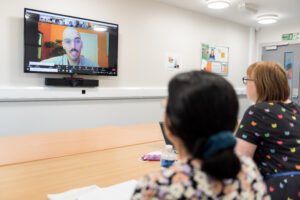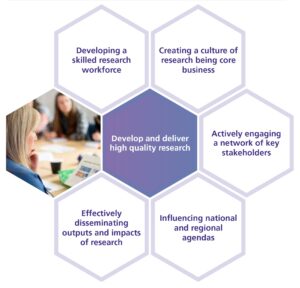Research and Development Strategy 2022-2025
Contents
Foreword
 I feel very proud to be given the opportunity to write the opening words in this strategy. As you will read, it aims to secure research and development (R&D) into the core of what Leeds and York Partnership NHS Foundation Trust (LYPFT) is all about for years to come.
I feel very proud to be given the opportunity to write the opening words in this strategy. As you will read, it aims to secure research and development (R&D) into the core of what Leeds and York Partnership NHS Foundation Trust (LYPFT) is all about for years to come.
We have faced some incredible challenges over recent years and those that lie ahead will undoubtedly be some of the greatest that the NHS has faced since its inception. It is easy under those conditions to be reactive and favour quicker and easier solutions over those that are underpinned by evidence and research. It is essential however that we continue to dedicate thinking, resource and skilled staff towards research and development, as only by doing so will we achieve resilient recovery as a health care system and continue to be able to decide how to best use the resources that we have at our disposal.
Placing research at the centre of what we do as an organisation has the potential to release real benefits into the Trust, in terms of quality of care and outcomes and being involved in research can enhance our daily working lives. It also ensures that we are able to contribute to the wider mental health research efforts in the UK. It is for those reasons that I have been so keen to ensure that research within LYPFT has an appropriately prominent position and that we increase the numbers of of us involved in research activity.
Achieving that has been down to the hard work of those in the R&D department and the willingness of service users and staff to embrace the importance of the work that they conduct alongside them. I am hugely grateful for those efforts and for the work that has gone into this strategy. I am now looking forward to the next strategic phase of research evolution in the Trust that will be achieved via the priorities and actions outlined here.
Dr Chris Hosker
Medical Director
 The constant during the past two years has been disruption. This disruption has underlined the importance of research; the Research and Development department at LYPFT have not only contributed to research necessary to the pandemic but have continued to support more than 50 studies with over 1000 participants. They have continued to promote and embrace the importance of good research into mental health.
The constant during the past two years has been disruption. This disruption has underlined the importance of research; the Research and Development department at LYPFT have not only contributed to research necessary to the pandemic but have continued to support more than 50 studies with over 1000 participants. They have continued to promote and embrace the importance of good research into mental health.
Our Trust values have been vital over the last two years and will continue to be; we have integrity, we keep it simple and we are caring. These values are embedded in our Research Strategy for 2022-2025. Our success is defined by creating a culture of research with a highly skilled workforce and actively engaged key stakeholders. The Help from Experts by Experience for Researchers (HEER) group is one of those stakeholders and, also as collaborators and co-designers with lived experience, are part of that skilled workforce. The HEER group is passionate about research as part of the road to recovery and have welcomed being part of the process for defining the strategy.
This strategy is about developing people and creating a post-pandemic normal where we embed research into the standard working life of clinicians, Trust staff and service users. We want research to be core business in LYPFT, to be visible and to be accessible. We want to continue to make a difference to the mental health of the UK.
Charlie Rust
Patient Research Ambassador and Chair of the HEER group
(A role that I not only get paid for but was recruited for during the largest pandemic in living history. Simple, integrity, caring.)
Background
 Benefits of research
Benefits of research
This strategy builds on the previous Research and Development Strategy for Leeds and York Partnership NHS Foundation Trust (LYPFT) that was delivered in 2018-2021. As an organisation we start with the fact that the opportunity to take part in research is an embedded part of the NHS constitution. The Health and Social Care Act 2012 places a legal duty on NHS England to promote research and the use of research evidence in the NHS(1). The NHS Constitution highlights our “commitment to innovation and to the promotion, conduct and use of research to improve the current and future health and care of the population”(2). The Government’s mandate to NHS England for 2018-19 also asks the NHS to support research, innovation and growth(3).
Research is an embedded part of the constitution because it offers a range of benefits to the NHS. Trusts which are more intensively involved in research have better clinical outcomes, even for service users not directly enrolled in research trials(4,5,6,7). Research is intrinsically linked with safety and quality. Service users often enjoy the experience of taking part in research(8). Research active organisations have a workforce who are more aware of current practice and including research in job plans can support recruitment and retention of staff. In areas where recruitment is particularly difficult this can be an important tool for Trusts to employ.
Recent national research strategies for both Nursing(9) and Allied Health Care Professionals(10) have created a framework to embed research into these roles. This gives us the opportunity to create clearer career pathways within our organisation. Finally, it is important to note that research forms part of the ‘well led’ CQC inspection and Trusts need to report on research activity.
Current context and wider landscape
The recent pandemic has shone a light on the importance of research and has never been more in the public eye. The public now has a better understanding of the tangible benefits that research can bring. We should utilise this increased awareness and ensure we continue to champion research. There has also been a renewed focus on mental health challenges facing the northern English populations we serve. There have been specific funding calls for mental health research in the North of England and the National Institute for Health and Care Research (NIHR) Clinical Research Network for Yorkshire and Humber have mental health as one of their strategic priorities. The upcoming creation of Integrated Care Systems brings both challenge and opportunity. The creation of Provider Collaboratives can create challenges for the regulation of research which is not set up to operate in the new infrastructure, but working collaboratively across both place (Leeds and York) and region could bring great benefits.
A framework for mental health research was developed in response to a recommendation in the Five Year Forward View for mental health published in February 2016 by the independent Mental Health Taskforce(11). The report offers a collective view of how mental health research should move forward over the next decade. Highlighting the need for early intervention and the lifelong consequences of developing a mental health problem at a young age. It recognises the importance of service user involvement in research and suggests strengthening links between physical and mental health as well as better infrastructure and coordination. The report also focuses on the needs for better use of health care data.
As a research-active organisation we work within a wider funding model and within local and national infrastructure. It’s important we understand this wider landscape and the drivers that will control it. We have created this strategy acknowledging this broader context.
The last three years have seen notable disruption to health services due to the pandemic but despite this in 2020/21 the Trust recruited over 1000 participants and supported 52 studies. The studies were across a range of service areas. The Trust supported two Urgent Public Health studies in 2020/21 SIREN (SARS-CoV-2 Immunity and Re Infection Evaluation) and CCP (International Severe Acute Respiratory and emerging Infection Consortium Clinical Characterisation Protocol United Kingdom). Both these studies provided essential information which informed public policy around Covid-19. The Research and Development team also provided leadership and resource to several vaccine studies (Novavax, Astra Zeneca and CovBoost).
 Putting service users at the heart of research
Putting service users at the heart of research
Including service users and families in research is essential and improves the quality and relevance of research activity. We now have a Patient Research Ambassador as a paid role within our team. The role provides leadership for patient and public involvement and chairs our “Help from Experts by Experience for Researchers” (HEER) group. The Leeds Recovery College opened in 2019 and delivers a range of education and training courses to help increase awareness and understanding of mental health, wellbeing and personal recovery. One of the courses offered “Let’s talk about… making a difference: Research and you” has been co- facilitated by a member of the HEER group alongside our R&D staff.Consent for Contact has been enabled within the organisation allowing consent from service users to be approached about research to be recorded in the Electronic Health Record. This creates a more efficient way of conducting research within the organisation and empowers service users to make their own decisions about getting involved in research.
Developing the next generation of researchers
The Trust now provides training to five Academic Clinical Fellows and has a Speech and Language Therapist Cardinal Fellow. We are excited to announce the successful delivery of the first LYPFT Clinical Academic Research Internship programme. The programme aimed to provide an insight into the world of applied research; to develop stronger links between clinicians and academics; to support clinicians to consider a clinical research career and provide an overview of the pathways to achieve this. The internship was aimed at non-medical healthcare professionals and eight individuals were offered a place from a range of professions. The Internship ran from November 2020 to April 2021. Feedback has shown that the Internship was valued by those who took part, and we continue to track longer term outcomes. We recently piloted a ‘Research Experience’ for student nurses working within our organisation. This gives them the opportunity to get hands-on experience of research in a clinical setting. The experience was co-designed with a student nurse who was shortlisted for a national award because of this work.
Celebrating success and disseminating outputs
We publish a quarterly magazine ‘Innovation’ that shares the outputs of research we have conducted. The magazine has been produced for over 14 years and has 46 editions. Over the last three years 157 peer reviewed publications have been produced related to research activity conducted in the Trust. We also hold an annual Research Forum that showcases research we have conducted in the Trust. The event attracts speakers from across the country showcasing research of national importance we have contributed to as well as considering how we embed research into careers within the NHS.
![]() Developing a new strategy
Developing a new strategy
With clear evidence of the benefits of research for the NHS and service users, and the current focus on clinical research, this strategy looks to build on previous successes within research and development at LYPFT. It outlines the next steps we will take to ensure as an organisation we give our service users as many opportunities as we can to participate in research that is relevant to them and our organisation. Research is the future of our services as it will provide the evidence we need to establish new treatments, enhance existing treatments and ensure we are providing a high quality service.
This strategy has been developed with consultation from internal staff, service users and external stakeholders.
Being part of Leeds and York Partnership NHS Foundation Trust (LYPFT)
LYPFT has a five year plan which includes the values, strategic objectives and priorities shown below.
|
Our values |
||
|
We have integrity |
We keep it simple | We are caring |
| We treat everyone with
respect and dignity, honour our commitments and do our best for our service users and colleagues |
We make it easy for the
communities we serve and the people who work here to achieve their goals |
We always show empathy and support those in need |
|
Our strategic objectives and priorites |
||
|
We deliver great care that is high quality and improves lives |
We provide a rewarding and supportive place to work |
We use our resources to deliver effective and sustainable services |
The Research and Development Strategy outlined integrates these organisation values and objectives. As described in the background, research is intrinsically linked to high quality care and research allows us to shape the future of mental health care services. It also supports the organisation to be a rewarding place to work by offering new skills and opportunities for staff. Research tells us the effectiveness of new treatments and care.
Objectives and strategies
The objective of the LYPFT Research and Development department is to develop and deliver high quality research.
Success is more high-quality research delivered across a broad range of service areas.
The above objective will be delivered using the following strategies:
- developing a skilled research workforce;
- creating a culture of research being core business;
- actively engaging a network of key stakeholders;
- influencing national and regional agendas;
- effectively disseminating outputs and impacts of research.

What we will do
Create a culture of research being core business by:
 working closely with the Trust executive team and others to place research at the centre of Trust activity;
working closely with the Trust executive team and others to place research at the centre of Trust activity;- empowering clinical teams to consider research as part of their role;
- creating additional joint clinical/research roles across the organisation where research is included within the job role;
- providing assurance around Care Quality Commission (CQC) research standards;
- building awareness of the benefits of research throughout the organisation and across professional groups;
- ensuring there is an effective communication and marketing strategy for research and development;
- giving staff simple ways to engage in research including links with service improvement and evaluation;
- Learning from feedback provided by service users on their experience of participating in research with us;
- creating a ‘research ready’ environment for commercial contract studies and actively seek to attract commercial studies;
- measuring the representation of our research population to determine if it aligns with our service users;
- making research smoother and more efficient (for example Consent for Contact, Akrivia Health implementation).
Success is visibility and knowledge of research and its contribution across the organisation.
Develop a skilled, research-active workforce by:
- developing research career pathways for nurses and allied health professionals including the consideration around an internship programme for research;
- continuing to support the Academic Clinical Fellows programme including after the completion of the ACF programme by enhancing recruitment, optimising experience and maximising the proportion obtaining PhD funding;
- engaging trainee medics in research opportunities and continue to support the trainee research ambassador;
- creating a ‘Research Experience’ programme for student nurses and allied health professionals to support them to understand how they can embed research in their everyday roles;
- ensuring we have appropriate training in place to allow us to deliver commercial research.
Success is a skilled research workforce across all professional groups.
 Actively engage a network of key stakeholders by:
Actively engage a network of key stakeholders by:
- strengthening links with universities and other key partners by understanding their assets and areas of mutual benefit;
- developing a clear external research profile;
continuing to develop service user involvement through the HEER group;
developing a process for co-designed research with service users including recruitment strategies; - the development of a young persons advisory group (YPAG) for child and young people Mental Health Research;
- sharing our knowledge of our service user populations externally and with key partners to ensure we offer inclusive research opportunities;
- prioritising activity in current areas of strength (children and adolescents, dementia and liaison psychiatry).
Success is an understanding of our key stakeholders and productive relationships with those that are essential influencers.
Effectively disseminate research outputs and impact by:
- ensuring relevant and engaging communications of research activities are shared in a range of formats with a range of audiences;
- sharing service users’ stories of contributing and benefitting from research ensuring these represent the diversity of our populations, valuing and supporting everyone;
- producing peer review publications;
- sharing the impact of research.
Success is a range of visible outputs and impacts of research for diverse audiences.
Influence national and regional agendas by:
- shaping National Institute for Health and Care Research (NIHR) Clinical Research Network agenda;
- shaping the Integrated Care System agenda;
- encouraging individuals to contribute to areas of national importance;
- shape Leeds Academic Health Partnership agenda;
- shape national and regional agendas for inclusivity and diversity in clinical research.
Success is to actively contribute to activities that are of benefit to our organisation.
References
- Health and Social Care Act 2012
www.legislation.gov.uk/ukpga/2012/7/pdfs/ukpga_20120007_en.pdf - The NHS Constituation for England
www.gov.uk/government/publications/the-nhs-constitution-for-england/the-nhs- constitution-for-england - The Government’s revised mandate to NHS England for 2018-19 https://assets.publishing.service.gov.uk/government/uploads/system/uploads/attachment_ data/file/803111/revised-mandate-to-nhs-england-2018-to-2019.pdf
- Levels of research funding and patient recruitment were associated with lower mortality among non-elective admissions in English Trusts. (Ozdemir et al, 2015) https://journals.plos.org/plosone/article?id=10.1371/journal.pone.0118253
- High hospital research participation and improved colorectal cancer survival outcomes: a population-based study (Downing et al, 2017). https://gut.bmj.com/content/66/1/89
- The correlation between National Health Service Trusts’ clinical trial activity and both mortality rates and Care Quality Commission (CQC) ratings: a retrospective cross-sectional study (Jonker and Fisher, 2018)
www.sciencedirect.com/science/article/abs/pii/S0033350618300015?via%3Dihub - The correlation between National Health Service trusts’ clinical trial activity and both mortality rates and care quality commission ratings: a retrospective cross-sectional study (Jonker and Fisher 2020) https://pubmed.ncbi.nlm.nih.gov/29438805/
- Participant in Research Experience Survey (PRES)
www.nihr.ac.uk/patients-carers-and-the-public/i-want-to-learn-about-research/participant-in- research-experience-survey.htm#:~:text=PRES%20was%20developed%20by%20the,on%20 people’s%20real%2Dlife%20experience. - Making research matter – Chief Nursing Officer for England’s strategic plan for research www.england.nhs.uk/wp-content/uploads/2021/11/B0880-cno-for-englands-strategic-plan-fo- research.pdf
- Allied Health Professions’ Research and Innovation Strategy for England www.hee.nhs.uk/sites/default/files/documents/HEE%20Allied%20Health%20Professions%20 Research%20and%20Innovation%20Strategy%20FINAL_0.pdf
- A Framework for mental health research https://assets.publishing.service.gov.uk/government/uploads/system/uploads/attachment_ data/file/665576/A_framework_for_mental_health_research.pdf
Page last updated: 20th May 2025 3:45pm